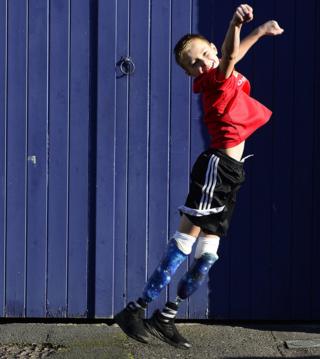[ad_1]

Image copyright
Equality Commission
Zack Gordon, now aged 10, was not allowed to use the trampoline at We Are Vertigo because of his prosthetic legs
A boy who was not allowed to use a trampoline because he has prosthetic legs has received a £2,500 settlement in a disability discrimination case.
Zack Gordon was seven when he visited the We Are Vertigo Trampoline Park in Newtownbreda, Belfast, in July 2017.
His family took legal action against the firm after Zack was refused access to the trampolines on safety grounds.
The firm said this was due to insurance restrictions and safety guidance from the trampoline manufacturer.
‘Upset and sad’
However, it settled the case and agreed to discuss its disability access policies with the Equality Commission, while “ensuring that we adhere to important health and safety guidance”.
Zack’s father, Patrick, said his family was angered by the incident, which happened while the boy was attending a summer scheme with his friends.
He explained that Zack uses prosthetic legs which are made of plastic/fibre-glass and fitted with rubber feet.
Mr Gordon said that when his son arrived at the venue, he watched a safety video and was “given a wristband and socks for using the trampolines along with all the other kids”.
“Zack was then told he couldn’t use the trampolines,” Mr Gordon said.
‘Proactive duty’
At the time, staff at the venue suggested other things he could do instead, but Zack did not want to leave his friends who were playing on the trampolines.
Mr Gordon said his son was “upset and sad and when he got home he stayed in his room”.
“His mother and I were angry and hurt.”
The family took a case against the firm based on the Disability Discrimination Act, and their action was supported by the Equality Commission for Northern Ireland.
The Equality Commission’s Anne McKernan said parents of disabled children focus on what they can do, not what they cannot
“The Disability Discrimination Act includes a proactive duty which requires service providers to think about what adjustments they should make to their services to ensure that people with a disability can access them”, said the commission’s director of legal services, Anne McKernan.
“Play is a vital part of growing up for all children and parents of disabled children will be keenly aware of the importance of focusing on what their children can do, rather than on what they cannot.”
‘Safety’
In a statement, a spokesperson for We Are Vertigo said that as a “responsible business,” it had to adhere to “important safety protocols”.
“In this case, at our former trampoline park in Newtownbreda, guidance from the manufacturers of the trampoline equipment and restrictions from our insurance company meant we were unable to provide access to the customer,” the firm explained.
“For safety reasons, we were advised that patrons with prosthetic limbs were not permitted to use the equipment; this is a known issue with trampolines and other high-adrenaline sports and adventure activities and not isolated to our facilities.”
The firm added it has “gone to great lengths to provide access to our facilities to people with many disabilities, including weekly sessions for children and young adults with autism and other sensory conditions”.
The company said the trampoline park in Newtownbreda referred to in this case was replaced with a new Inflatable Park in January.
It added that trampolines are no longer available at the facility.
[ad_2]
Source link


